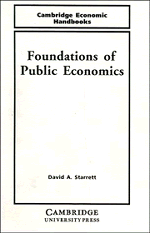Book contents
- Frontmatter
- Contents
- Preface and acknowledgments
- Notation
- PART I Scope and limitations
- PART II Decision making in a mixed economy
- 5 Planning mechanisms
- 6 Models of a mixed economy
- 7 Government budgeting and fiscal decentralization
- 8 Public pricing and optimal-commodity taxation
- PART III First-order project analysis
- PART IV Evaluating large projects
- Epilog
- References
- Author index
- Subject index
8 - Public pricing and optimal-commodity taxation
Published online by Cambridge University Press: 04 April 2011
- Frontmatter
- Contents
- Preface and acknowledgments
- Notation
- PART I Scope and limitations
- PART II Decision making in a mixed economy
- 5 Planning mechanisms
- 6 Models of a mixed economy
- 7 Government budgeting and fiscal decentralization
- 8 Public pricing and optimal-commodity taxation
- PART III First-order project analysis
- PART IV Evaluating large projects
- Epilog
- References
- Author index
- Subject index
Summary
We complete our analysis of the general budgeting problem in the mixed economy with a discussion of “optimal” finance. We focus on a particular constituency (which we assume must be self-sufficient) and ask how it should best collect money to finance its operations. In principle, the issues here involve both optimal pricing of publicly provided excludable goods and optimal taxation to pay for unfunded costs of providing nonexcludable goods. Although the first of these problems is not of major importance in the U.S. economy, it is worth our attention for several reasons. First, it does play an important role in budgeting for some of the European socialist democracies. Second, the “public-pricing” and “optimal-taxation” problems have strikingly similar structure so that each provides insight into the nature of the other. Finally, the public-pricing problem provides a useful transition from “optimal-planning” problems of the type discussed in Chapters 3 and 5 to the type of second-best analysis for the mixed economy that will occupy us in much of the sequel.
Optimal public pricing
We start with the budgeting problem for a very simple government, one that provides only excludable goods and has no taxing powers. “Public” activity involves producing some subset of excludable goods and selling them in such a way as to cover all costs (a constraint that follows from the lack of taxation power). Alternatively, the following model can be applied to the analysis of a government enterprise required by law to balance its budget. Although the second interpretation is more realistic, the first is useful in making comparisons with the “optimal-tax” model to follow.
- Type
- Chapter
- Information
- Foundations in Public Economics , pp. 120 - 142Publisher: Cambridge University PressPrint publication year: 1988



